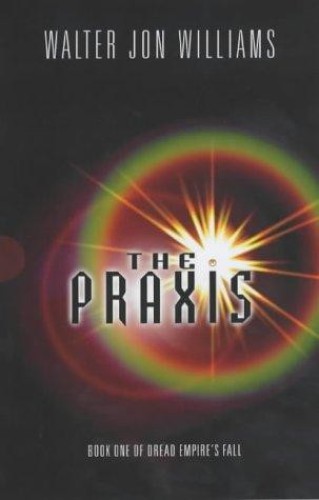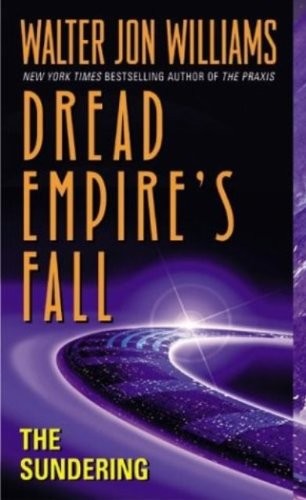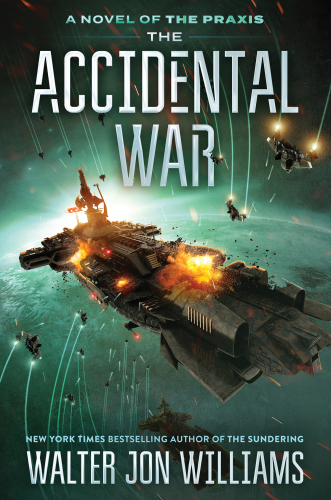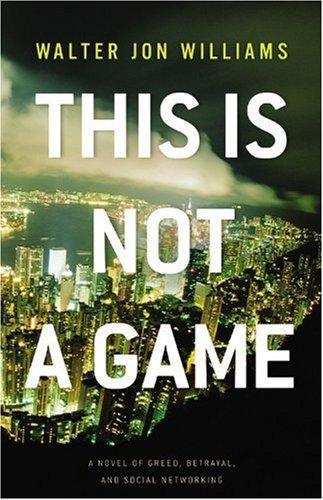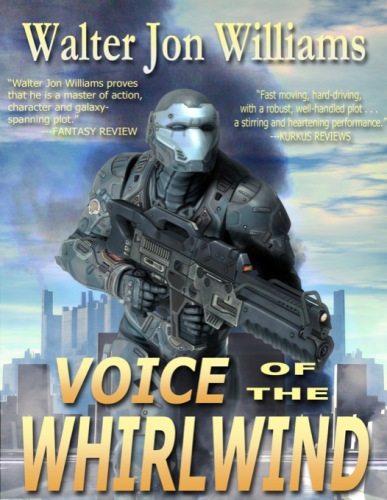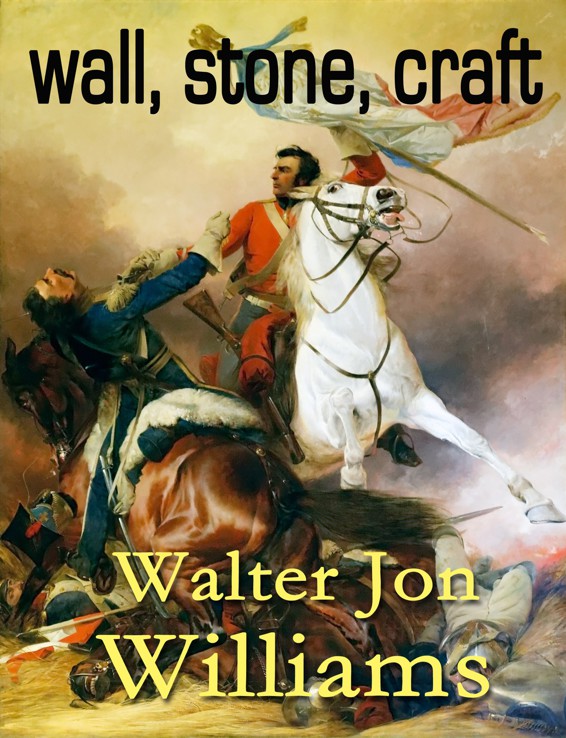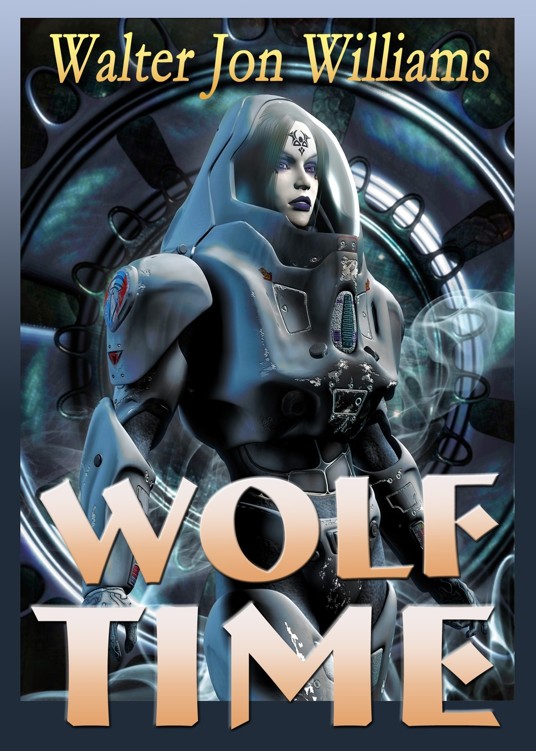oleebook.com
Conventions of war de Williams, Walter Jon
de Williams, Walter Jon - Género: English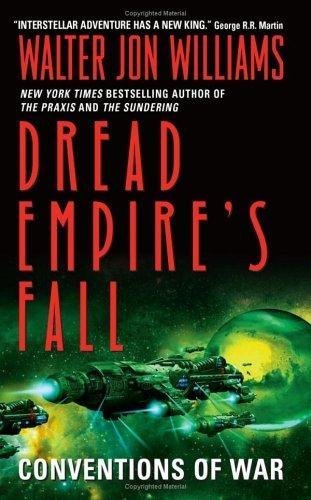
Sinopsis
Overview: The Dread Empire's Fall is a science fiction series by Walter Jon Williams.The novels are of the Military science fiction sub-genre.
Descargar
Descargar Conventions of war ePub GratisLibros Recomendados - Relacionados
Reseñas Varias sobre este libro
This third book, originally conceived as a trilogy, is easily the best. (So far)
Everything about it is extremely satisfying even if it is very frustrating for the two main characters.
The battle on the homeworld, overthrowing the invaders, feels just a more fantastic, more glorious version of the French Resistance during the WWII occupation, but thanks to the full weight thrown into the economics, the intrigue, great hacking, and the rising up of the population, it happens to work BETTER, IMHO. At least for a coherent story. And I rather cheered throughout it. :)
The battle out in space was no less fun, but I tended to get a bit more frustrated with the Old Praxis way of doing things. Stupidity and tradition do seem to go hand-in-hand, no? So my frustration was always on the side of our dear hero who always had a trick up his sleeve. Gotta love this kind of story. :)
All told, the entire novel is pretty freaking fantastic. My original reservations during the first novel were washed away in the steamroller of the story that came after. :) This is one of the best Space Operas I've read.
I totally recommend THE SERIES. By no means do yourself the disservice of merely reading the first book. :)2020-shelf sci-fi space-opera21 s Ivo217 18
Unterhaltsamer letzter Teil der Space-Opera-Trilogie. Die Protagonisten Sula und Martinez sind mir inzwischen richtig ans Herz gewachsen. Ich werde sicherlich nochmals in das Praxis-Universum rein schauen, auch wenn sich während der letzten Raumschlacht doch erste Ermüdungserscheinungen bei mir gezeigt haben.sci-fi-novels7 s Florin PiteaAuthor 40 books196
Superb. Highly recommended.science-fiction7 s Peter Walton-Jones136 2
While it will not stick in the memory as a major classic, I have enjoyed this series. Conventions of War concludes the sequence and provides a satisfying finale. The characters (Sula and Martinez in particular) are interesting and engaging. The themes of class and difference are important to the story but do not take it over.
The space travel narratives are interesting for the wormholes and the gravities experienced during accelerations. Williams fills in the time gaps here with a murder mystery that is not crucial to the whole story but provides a glimpse into the future universe where creativity and the spiritual have been diminished and are illegal or at best unwelcome in the worldview of the powerful.
The battle scenes are exciting and the detail is not at all tedious. Sula's leading of the armed rebellion on Zanshaa is exciting combat action story telling very well done. She is a very cool (and flawed... the best heroines) chick!
This book was my favourite in the series.sci-fi space-opera5 s Jamie Collins1,456 306
3.5 stars, this is solidly entertaining space opera. This feels the ending of a trilogy, although its left open for sequels and the author produced them only a few years later. I look forward to reading them.
About half of this quite long book centers on Martinez, who is captain of a warship in the fleet which has been sent to fight the rebel Naxid. Hes becoming a little more successful in convincing the fleet to try some new tactics. Meanwhile Sula has been left planet-side, leading the efforts to resist the enemy occupation of the empires capital city. Shes blowing things up and printing subversive pamphlets and making useful friends in the citys underworld.
It remains fascinating that the characters never once bemoan the fact that their government is brutal (many crimes are punished with death-by-public-torture) or that their society embraces patronage and nepotism to the point of being feudal. The rebels in this story are fighting to put themselves in charge of this system, not to change it.science-fiction scifi-aliens scifi-military4 s Phil1,919 180
Quite a nice trilogy by Williams. I think this was the first of his work I read some decade or so ago. Difficult to categorize, but a largely feudal society consisting of five races the Shaa had subjugated thousands of years ago, and with the death of the last Shaa, civil war breaks out. On one side are the Naxods, an insectile species, and the other are the Fleet with the rest of the population. Our heroine Caro leads a bloody insurrection within the formal capitol, while our other hero dukes it out with the fleet, pursuing the rebels. Lots of politics, vivid imagery, and even some romance. Nice ending.science-fiction3 s Stephan236 7
As expected, the third volume of the first Praxis trilogy picks up speed again. The book is around 650 pages, and it's packed with action. Conventions of War is a mixture of a restoration comedy of manners and a naval action novel, with even a bit of whodunnit thrown in, all translated into the future and moved into space. As with much military SF, a lot of the time Hornblower shines through the cracks, sometimes quite brightly.
If anything, the book is too long and too full. Some of the twists seem unnecessary, and the computer science of the former Shaa empire is distressingly old-fashioned. But the book is so smoothly written and entertaining that I really cannot complain much. Recommended for everyone who read the first two volumes - it's a decent and satisfying conclusion to the story arc, but leaves enough leads for further development.
My edition has a free sample chapter for the first book of the second praxis trilogy at the end. It's set 7 years later, and features the same characters. Don't read that, unless you plan to go on and read the new series anyways. It's too compelling ;-).2 s Fred Hughes760 49
A great military epic space battle story. Although this is book 3 in the series it stands on it's own. I was immediately attached to the characters and knew what was going on.
Epic battles on land and in space. Good antagonist is an alien species and great heroes.
All around a GREAT READ2 s RobAuthor 19 books31
Conventions of War is the third and final novel in Williams' Dread Empire's Fall series. Lady Caroline Sula leads the guerrilla war against the rebellious Naxids on the Empire's occupied capital world of Zanshaa, while Lord Gareth Martinez commands a battleship in the Fleet task force waging a war of attrition on the enemy's economic heartland a la Sherman's March to the Sea.
I can't say much more about the plot without giving it away, but I can say the book wraps up the series with an ending that -- while not happily ever after -- was appropriate to the characters considering their previous actions.
Williams did all the things in Conventions of War that entertained me in the first two books -- military space opera without the technical jargon, conflicted characters I cared about, and realistic spaceships and space warfare. Don't get me wrong, I love laser battles and warp drive ships any good sci-fi geek, but it was interesting to read about the challenges starship crews face with high-gravity accelerations and decelerations, along with the months it takes to simply go from one end of a single solar system to another.
If I had any criticism it would be the first two-thirds of the book felt Williams was killing time before getting to the brutal fight for Zanshaa and the ultimate space battle with the Naxids. While Sula's guerrilla exploits against the Naxids were appropriate to the story (though a tad drawn out), the murder mystery Martinez had to solve seemed thrown in just to give him something to do until the final battle.
That said, I still enjoyed the book and the series overall. While not as entertaining as book two ( The Sundering ), it was a satisfying conclusion to one of the best space opera series I've ever read.2 s Brian175 1 follower
It took me almost three years to finish this series, but i'm glad I did.
On the surface this book seems a typical science fantasy/space opera epic. Humans have left earth and colonized space and joined an empire comprised of many other races. But when the empire falls apart, humanity goes to war with its millions strong armed forces. But this story isn't about a struggle vs good and evil, instead it focuses on the surreal lives of the people in command and the absurd social situations they are in as hundreds of thousands of lives are lost around them.
Also it's quite funny.2 s eisn68
Half the book was almost irrelevant to the larger plot. Disappointing ending to the trilogy. Also too much romance. Even the ending is about that.2 s Tasula1,712 17
Love this author, especially This is Not a Game and its sequel, and I loved this book too, even though I didn't realize it was the end (instead of the start) of a trilogy. The Lady Sula character was wonderful, the people in the secret army she raised were also wonderful (Casimir, PJ Ngeni, Spence, McNamara, Sergei, etc.) I was very upset when certain ones died during the final battle against the insectoid Naxids who had rebelled and tortured to death 200 of Lady Sula's loyalist friends. Sula's comments about Capt. Martinez, aboard a spaceship chasing Naxids, were such a contrast to his own thoughts about himself. Sula thought he was a scheming self absorbed man happy to step over the corpses of anyone who stood in his way of promotion. Martinez considered himself an honorable, courageous soldier. (Naturally, they had had a sexual relationship that didn't work out.) I wasn't crazy about the ending because of the involvement of Supreme Commander Lord Tork (aka stodgey old fogey aka f__t) who despised both Sula and Martinez.1 Craig5,356 129
Conventions of War is a very good concluding volume for Williams' Dread Empire's Fall trilogy. It's a very, very long novel, and once again alternates viewpoints between doomed star-crossed lovers Caro Sula and Gareth Martinez. She stays behind on the capitol planet and leads guerrilla activities against the evil invading Naxid conquerors while he stays with the fleet and pursues the interstellar war relentlessly. At times both have to wonder whether the bigger enemy is the Naxids or their own tradition-bound leaders who are so opposed to any change or innovation. There's one thread of shipboard murder mystery that stretches perhaps a bit too long, but other than that it's a completely engrossing technicolor space opera, but with really well developed charters. After the battles have all been fought (both on the streets and in the spaceways) and the heroes rewarded (or not) and the villains vanquished (or not), the big question is finally answered on the very last page. I enjoyed it very much. 1 Cass939
4,5sci-fi1 Nis359 16
I found it hard to ever really get excited by this series, since both sides of the conflict are equally horrible and unable to change, and even the main characters lack introspection. The action sequences are decent, but there is a lot of drag in between. And it is annoying that the author tries to be realistic by talking about orbits and speeds, but clearly has no understanding of orbital mechanics.
Whatever GRRM says Bujold and Weber are leagues better in each their way1 Clyde847 53
This completes my re-read of the original Dread Empire's Fall trilogy. Good story about the disintegration (at least the beginning thereof) of an empire when the despotic power that holds it together disappears.
One thing I about this series is that Williams doesn't posit any magical advanced technology. With the possible exception of wormholes for interstellar travel, everything is an extension of known science and technology -- no FTL drive or communication, no inertial compensators, no newly discovered energy sources. That means, to get around in star systems in any reasonable time, ships (and the people in them) have to endure extended periods of high-G acceleration. That of course applies to space combat too. (Power for all this comes from antimatter, for which practical handling technology has been developed.)
I look forward to more adventures of Lady Sula and Lord Martinez.military re-read science-fiction1 Youko83
The civil war continues in Conventions of War, and it sure felt it could've come to a close a lot faster. This was one of those books at I feel could've been cut down by half, ad it would've benefited enormously. The whole murder-mystery bit on Martinez's ship was a colossal waste of pages for me. I do enjoy a good mystery, I even enjoy a good genre-blending mystery (see Leviathan Wakes or Something Coming Through for good examples) but I did not how that element came out of nowhere in this book and took so much time to slog through. Ditto with the romance element with Sula and Casimir on Zanshaa, what was that about? Williams is clearly capable of writing a strong female character at doesn't have to fall in love with a man (Michi) so why add that unnecessary element to Sula? She actually became a very interesting character until the weird romance kicked off, and as soon as it happened, Casimir's fate was sealed. Oh well. I had to skim some portions of extensive descriptions again, but I have to say that in the end, I d the overarching plot and the setting enough at the core of this story that I mostly enjoyed this book.
Not enough to recommend it though.science-fiction1 Pie Pie156 1 follower
The final book in the Praxis series. I call it the Praxis series because all three books wrestle with the idea of final knowledge. The Praxis teaches that everything important is known and that intelligent species can take comfort in that fact instead of believing in the unknown. This book deals with not only the spiritual side of this ideology but also the logical side of it. It explains the former without getting preachy and outright invalidates the latter.
Even though the book's ending isn't 100% happy ending it was satisfying and real.
This book in the series is the best one by far. It's reading 4 books in one as four completely distinct narratives come to fruition throughout the pages. Not only that, but the emotions of the characters burst from the pages at every turn. There was nothing I wanted more than to just find out what happens next. Even for the two lampshaded "luckiest people in the universe" the road was harrowing and impassioned. While the first two books are excellent in their own right, this one by far surpasses them in both quality and quantity. sci-fi-outer-space1 Chris439 6
I've been thinking a lot about what makes this series more successful than Implied Spaces, and eventually realized that you can tell the two heroes and one other character are smart, because nobody else in the whole 3 books ever has a bright or novel idea. I realize it's a stagnant society, but that seems extreme.ebooks1 Larry Kenney203 9
Another great book in the series. It wasn't quite as enjoyable as the first two in the series, I thought, as the relationship between Martinez and Sula has changed quite a bit, but over all a very enjoyable read. I'm hoping for more in this series!1-science-fiction1 Steven246 2
I'm letting this stand as my review of the series: the first two were great, and the last was good, except that the characters made decisions that caused me to hate them. By the end of the book, I wanted most of the characters to be miserable because I didn't them anymore...1 Gwen277
Long live the Praxis! I WANT MORE!!!1 Bill136 2
No real tension. I never felt I got to understand the Shaa or Praxis enough. I knew our "heroes" would win battles and didn't really care one way or the other. 1 Daniel1,001 6
The weakest of the trilogy and the ending just wasnt good. A disappointing end to an entertaining series.sci-fi-fantasy1 Artur Coelho2,369 64
O vibrante na space opera militarista é, como não poderia deixar de ser, a descrição das operações militares, as táticas, estratégias e momentos de combate férreo. Walter Jon Williams não desilude, e é brilhante na forma como explora as convenções do género. As batalhas espaciais deste livro (e somos mimados com três) mantém-nos agarrados páginas a fio, numa leitura imparável. Mas um livro não é feito apenas disto. Tem de haver um mundo ficcional coerente, e personagens com que o leitor se identifique.
Nisto, o autor também segue bem a cartilha, adensando cada vez mais este mundo ficcional fraturado. Boa parte do livro mergulha-nos nas tortuosas relações de poder de um império que se encontra numa curiosa guerra civil, entre conservadores e ultra-conservadores. Talvez aquilo que mais salta à minha leitura seja o estranhar de não ter sido seguido um outro caminho. Williams cria uma sociedade profundamente conservadora, clientelista, e corrupta nos seus escalões de topo. Uma corrupção que é tida como natural, como uma tradição. Seriam bons ingredientes de uma narrativa clássica em que uma sociedade corrupta se desmorona, mas não. O caminho seguido é o do reforçar do poder das elites clássicas, mesmo recorrendo a óbvios combatentes livres.
Algures durante o livro, numa parte onde somos levados à organização e condução de uma guerra terrestre contra os ocupantes da capital imperial, uma das personagens principais mostra-nos essa óbvia conclusão, ao mobilizar civis e criminosos para lutar pela restauração de uma tirania que tinha apenas a vantagem de ser um pouco mais inepta do que a tirania dos invasores. Talvez esteja aqui a chave para a continuidade da série, a óbvia derrocada de um império cujos governantes de mão de ferro se extinguiram, e o deixaram nas mãos de tradicionalistas ligados a clientelas, cujos jogos de interesse vão inevitavelmente gerar conflitos. Especialmente se for levado em conta que o império reúne diferentes espécies alienígenas, normalizadas e integradas numa sociedade comum após a sua conquista pelos fundadores do império.
No campo dos personagens, todo o livro é atravessado por uma história tortuosa de amor entre as duas principais personagens. Martinez pertence a um clã poderoso, mas de segunda linha, cujo líder se desdobra em esforços e jogadas para chegar às principais esferas de poder. Mas Martinez prefere a vida de oficial militar, e é excelente nisso, por ter a capacidade de pensar fora dos limites de um pensamento militar fossilizado nas tradições de uma frota estelar que, apesar de poderosa, foi durante séculos meramente cerimonial.
Sula é a herdeira de um clã caído em desgraça, é implacável na forma como, a pulso, constrói o seu percurso. Tão implacável que, na verdade, não é quem diz ser. Na adolescência, assassinou e roubou a identidade da legítima herdeira do clã, que dissipava a sua vida em overdoses constantes de drogas. Com isso, fugiu ao destino de ser brinquedo sexual dos pequenos criminosos de vida curta que sobrevivem nas fímbrias da sociedade imperial (uma excelente forma do autor mostrar que o mundo perfeito das esferas sociais na verdade assenta sobre opressão e pobreza). Apesar deste passado secreto, revela-se uma estratega de primeira, tão capaz de vencer esquadrões de combate inimigos em batalhas no espaço como de organizar uma insurreição que, contra todas as expectativas, derrota os invasores antes do regresso das forças imperiais.
Para além da tensão amorosa, complicada pela história de vida de Sula e os jogos políticos e económicos do clã de Martinez (sem querer muitos spoilers, digamos que pelo meio há abandonos, casamentos com outros clãs, e uma tensão amorosa que nem no final será resolvida), há outro tipo de tensões em jogo. Williams toca muito na tecla da tradição versus inovação. São os inovadores que conseguem salvar o império e derrotar os seus inimigos, e, no entanto, são sempre preteridos perante os tradicionalistas. Isto é particularmente óbvio no lado militar, onde as táticas clássicas apenas conseguem levar a pesadas derrotas e ao desperdício de homens e meios. Os que inovam salvam, literalmente, a pele aos tradicionalistas, mas são estes os que têm a primazia.
Tensões sociais e excelentes descrições de combate militar, contra um pano de fundo vasto, tornam estes livros uma excelente série de space opera militarista. Com o toque discreto mas corrosivo de todo o drama se desenrolar para manter viva uma sociedade obviamente corrupta. Vamos ver o que os próximos livros nos trarão. Rob Trans510 4
This is the best of the first three in the series. However, once again, the melodramatic description of the book used in its marketing is not entirely accurate.
This is an Age of Sail story set in the far future of space, although there is nothing particularly innovative about the science and weapons used by the various races. While the first two books contained a great deal of social commentary and aristocratic politics, this book focuses a little more on fighting the war. I thought we would get away from the author's inclusion of romance novel material, but it started to show up again about half way through. Too bad.
Martinez is back in the fleet and is a squadron tactical officer. Later he must be reassigned to replace a murdered ship's captain. The investigation of the murder is an interesting departure from what one normally finds in age of sail type novels. The tension continues between using old tactics which rely on brute strength and attrition vs. new tactics which rely on innovative maneuvering and flexibility.
Sula volunteers to be part of the guerrilla force which will remain behind when the empire's leadrship flee for their lives. The guerrillas are so ill-prepared they are mostly killed or captured. Sula is the sole remaining officer and finds herself having to take control of the guerrillas and recruit an underground to effectively carry out her mission. She finds it necessary to consort with elements of society that the peerage would never stoop to work with. The author uses this to point out the hypocrisy of the empire and its leadership which employ the same kinds of tactics, but make them legal for themselves.
Both of the main characters continue to be rewarded for their actions, and penalized because, since they are from less desirable elements of the aristocracy, it doesn't do for them to outshine their betters. Fortunately, in the wartime conditions the empire finds itself, there are leaders who value competence. However, the supreme leadership is firmly against them.
The two main characters are emotionally immature and seem spoiled. Professionally they behave mature, but in their personal relationships they are more 13 year-olds.
All in all a pleasant easy diversion, but not something to go out of your way to read. Tim Hicks1,597 121
We have to judge this against what it's trying to be. It's stock space opera, 20xx pulp fiction. Readers have well-defined expectations.
WJW is experienced and comfortable, and the conventions are standard for space opera. Specifically, space battles that are fought as if they were all on horses except for the occasional acceleration or swing around a planet mid-battle. Huge ships go head-to-head are are regularly blown up, killing thousands and destroying a billion-dollar ship. Or maybe it isn't because it seems to take just a couple of days to make another. Every ship carries planet-buster missiles (war is hell, eh?)
This type of SF absolutely relies on a post-scarcity economy with infinite resources.
Also, in stock space opera, the Hero Captains make ALL the decisions themselves, of course, and here we have TWO hero captains, both of whom are free to have sex with anyone they including their direct reports. But what I will remember here is the use of the Martinez Method or whatever, where Lord Tork uses Spanish Armada tactics in a world with wormholes and all, while our heroes are using the hull of a chaotic dynamic system (ooh! ahh! is that a chronosynclastic infundibulum?). Not sure how a mathematical system can have a hull, but OK.
There are thousands of ships, all with trained captains and strategists, but they are all idiots except two who just happen to know each other. Tork has made it to Admiral level with logistics as his only skill. Yet Martinez and Sula could no doubt be galaxy-class cellists or invent a new stardrive, should they so choose. I'll bet one of them could organize a revolution from scratch. Oh, wait, one did.
Reader, you and I both know *we* are that smart too, and surrounded by idiots M& S.
Martinez and Sula are both so caring for their crew, but each would happily have flicked away Tirza. I wouldn't trust either of them with anything I valued. Hey, it's OK for authors to create such characters. They have become jerks because of the environment they live and work in.
But I've had enough of ultra-capable heroes with dense superiors, and repetitive space dogfights.
I want new ideas, new directions, and there are LOTS of people writing them now - authors who weren't getting published in 2005.
science-fiction1 Scot Wilcox143
YES! The ending was exactly what I wanted. Anyways, we'll get there.
Much better than the second book, a tasty action packed adventure full of backroom deals, street combat, steamy flings, and intense ship battles. Gone is the society drama and the tentative romance, it's all war here, all the time.
Sula was the main character in this book, as she deserves. And this book doesn't pretend that she comes out of it unscathed. Sula leaves the war a vicious killer, ruthless and manipulative, willing to use anyone and anything to satisfy her pride. She's only alive out of spite, and dares the universe to bring her down. As much as this book is definitely written from a male perspective, it's also a feminist book. Sula is the smartest character in the whole series, and controls her own destiny more than anyone else. She's flawed, vulnerable in some ways, but takes what she wants despite all of that.
Martinez is definitely playing second fiddle here, as he should. He's self-absorbed and stupid in a lot of ways. His mystery subplot was a fine diversion from the gritty urban warfare on Zanshaa, however.
So! The end! Do Martinez and Sula, the destined lovers, finally get together despite everything?
NO.
Finally! A romance that actually ends for the best of all involved. Martinez doesn't even know Sula, he just thinks she's smart and hot. He's got a crush on her, a literal grade school crush. That's no basis for a good relationship. Sula is also woefully unequipped for any kind of equal human relations. Her pride would make everything into a competition, her ruthlessness would poison any intimacy they could have, her nihilism would crush their future. Not to mention her secret that she could never tell him. ALL the red flags, waving high for all to see.
It was just so refreshing to see our male protagonist actually not think with his dick for once. Finally.
Is this book deep? Not in the slightest. Is it fun? Heck yeah. Five stars.This entire review has been hidden because of spoilers.Show full review Dylan Vargas82
Conventions of War Specific review: This was simply a great ending to a really good series. It was chalk full of action and intrigue. The book develops a whole new theme of guerilla warfare which I felt only added to the world. It also plays with your expectations of Martinez from a character who can't seem to do no wrong to someone stifled and pushed aside. It did such a good job at creating a sense of frustration and celebration. Even though this was the final book, I never felt I knew the ending. It never made me fell something was inevitably going to happen or that something dramatic could happen that alters the entire plot.
Dread Empire's Fall Series Review: I loved the world that was built. I thought that their was a great blend of politics, action, personal relationships. I also thought the book did a very good job describing the different alien races, they felt fantastical but practical with very unique and interesting qualities. I also appreciate when a book introduces a new concept and how the book explains and illustrates space travel and combat was so unique and clearly thought out. Building on that, something not all science fiction books can do well, but I find this one successful at, is making scientific explanation and concepts comprehendible. I also appreciated how the world was supposed to be set in a more advanced future but how it was dominated by very antiquated traditions, political structures, etc. I know a book is good when it can make me root for even the richest onepercenters. A key theme of the entire series was economic inequality, but no matter how stark the author tried to make it, it was sad to know that our modern world is even worse off than this supposed world where wealth disparity is a crucial theme. Zeb Kantrowitz801 8
Autor del comentario:
=================================
